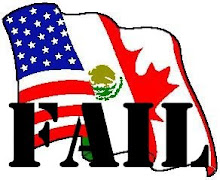I found myself frustrated with the rhetoric coming from the 2010 State of the Union Address this past week. The United States, reeling from one of the worst recessions in history, has tried to shore up the borders, circle the wagons, and focus on improving their economy in a time when so many are struggling.
I have no problem with them doing that. I would expect, in the same situation, that Canada would do the same and that our government would protect our people.
But President Obama made some interesting statements regarding job creation and immigration. He stated in his address:
Third, we need to export more of our goods. Because the more products we make and sell to other countries, the more jobs we support right here in America. So tonight, we set a new goal: We will double our exports over the next five years, an increase that will support two million jobs in America. To help meet this goal, we're launching a National Export Initiative that will help farmers and small businesses increase their exports, and reform export controls consistent with national security.
This may be music to the ears of Americans, but it puts a more sour taste in the mouths of other countries…especially Canada which has been impacted by the recent “Buy American” programs and sentiment perpetrated by the US government. So not only has Obama closed the door to Canadian business, he wants to see countries like Canada take more of their exports (and we’ve seen already that Canada holds the #1 and #2 rank for export partner to the various states).
The other statement that I cringed at was…
And we should continue the work of fixing our broken immigration system -- to secure our borders and enforce our laws, and ensure that everyone who plays by the rules can contribute to our economy and enrich our nation.
First of all…OUCH! The President said the immigration system is broken. That’s a strong statement to make. But its the part where he talks about ensuring that “everyone who plays by the rules can contribute to our economy and enrich our nation.”
If you’ve been reading this blog since the beginning, you know that this exists due to issues getting across to do some speaking. Since then, other incidents have popped up that highlight…well, that highlights the broken immigration system that the President referred to. But it also highlighted something else: that the current rules fly in the face of what Obama wishes for immigration. If a Canadian can’t speak at a conference not because he/she is getting paid but because attendees are paying to register, how are those established rules helping to “contribute to [the US] economy and enrich [the US]”?! That’s the problem, they don’t. And that’s the issue with these two statements, made at different stages of the address, but being opposed to each other nonetheless.
You can’t try and push exports through your borders and yet persist outdated immigration rules that are part of a broken immigration system (as Obama referred to it as). If President Obama is serious about immigration reform, specifically on the business and trade side, then there’s only one logical step: renegotiate NAFTA. Call Canada and Mexico to the table and talk about what needs to change, what improvements can be made, and how can we get North America back to being a power-house economical continent.
Until we get past protectionism though, that can’t happen.



